The cooper occupation still exists today. However, it was very significant and prevalent in Leith, Edinburgh, from the 18th until the 20th centuries. My interest in this old occupation was piqued when I began researching a family of coopers from Leith. Therefore, I decided to learn more about this fascinating job as part of my series on old occupations.
Why Leith?
Leith was the gateway to Scotland since it became Edinburgh’s official port in the early 14th century. As a bustling port town, Leith was home to thriving brewing, distilling, and food processing industries that required a large number of coopers.
What is a cooper occupation?
A cooper was a barrel maker. They were skilled craftsmen who specialised in making and repairing wooden barrels, casks, and other containers. The barrels were used for storing and transporting goods such as foodstuffs, liquids and dry goods. In particular, their skills were necessary to create sturdy containers used for storing liquids, such as beer, wine, whisky and spirits.
Coopers constructed barrels and casks from wooden planks bound together with metal hoops. They used traditional techniques with specialised tools such as such as hammers, barrel hoops, draw knives and side axes. These tools were used to shape, put together, and secure the barrels, ensuring they were watertight and structurally sound. An experienced cooper could tailor the size, shape, and design of barrels according to the requirements of the different industries.
Coopering techniques and styles varied from region to region, influenced by factors such as available resources, local industries, and cultural traditions. Different types of wood, such as oak, pine, and chestnut, were used depending on availability and suitability for the intended purpose.
Like other apprenticeships, coopers were expected to undertake their apprenticeship for a period of 7 years. At the end of his apprenticeship, a cooper would make a barrel from scratch, scorch the inside and then he would be rolled around in it by his co-workers.
Where to find information about the cooper occupation, particularly from Edinburgh?
The National Library of Scotland (NLS)
- The Book of the Incorporation of South Leith (ref: MS. 3411) is available to consult at the library. It contains records of transactions, entry fees, minutes, lists of apprentices and other interesting notes mostly from the 17th to the 18th century.
- There is an online video of a cooperage on the library’s website. Take a moment to watch it – it is fascinating.
- The online Post Office Directories for Leith are also available on the NLS website. They include the names of coopers and cooperages. Below is a list from the 1904-1905 Leith Post Office Directory.
Online Images and Exhibitions
- The Edinburgh online Capital Collections features images of coopers and cooperages based in Edinburgh and Leith.
- The online Old Leith Rediscovered has images of coopers from Leith.
- If you are local to Edinburgh, the Edinburgh Museums & Galleries has exhibitions about the history of Leith and Newhaven.
Other Archives
- The Incorporation of Coopers of Leith was an organisation that represented coopers in the area. They had a long history, with records dating back to 1550. These records are held at the City of Edinburgh Archives (Ref SL220 & Ref 68).
- The University of Glasgow Archives Services has the Records of William Lindsay & Sons Ltd, Coopers, Edinburgh (Ref GB 248 WL). William Lindsay started his cooperage business in the 1820s on the banks of the river Leith.
- ScotlandsPeople’s registers, valuation rolls and census records include information about cooper occupations.
The marriage register of a cooper called Hugh Waugh ((c) ScotlandsPeople OPR Marriages 685/ 2 450 487 St Cuthbert)
Other Resources
- Also, check monumental inscriptions, occupations are often added on the gravestone.
- The Leith, Edinburgh, and District Journeymen Coopers had members who served in the First World War. A Roll of Honour commemorates 46 coopers from this group who lost their lives during the war.
If your ancestor was a cooper and you want me to look up any of the archival records, then please get in touch. I would be happy to help.
The occupation of a cooper was highly respected and essential to the Leith industries and beyond. While the demand for traditional cooperage has declined with the advent of modern materials and container technologies, the legacy of coopers lives on in the rich history of Leith’s heritage.
Let me know in the comments below if you want me to write about a particular Scottish old occupation.
Good luck with your research.
Until my next post, haste ye back.
You may also like...
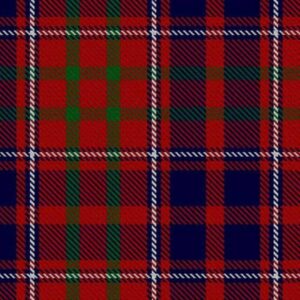
Cameron Surname: Origin, Meaning & History
The Cameron surname has Gaelic origins and it is associated with Clan Cameron, one of the most influential Highland clans.
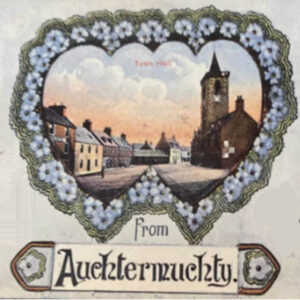
Ancestral Visit to Auchtermuchty, Fife
Auchtermuchty in Fife is known as Muchty to locals. What does Stratheden Whisky, Jimmy Shand and the Proclaimers have in common?
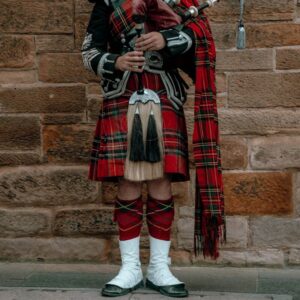
Discover Your Scottish Ancestry: The Rise of Ancestral Tourism
Scotland’s history and breath-taking landscapes continue to attract visitors from around the world searching for their Scottish ancestry. For many, the trip is more than just sightseeing – it is a journey of self-discovery.
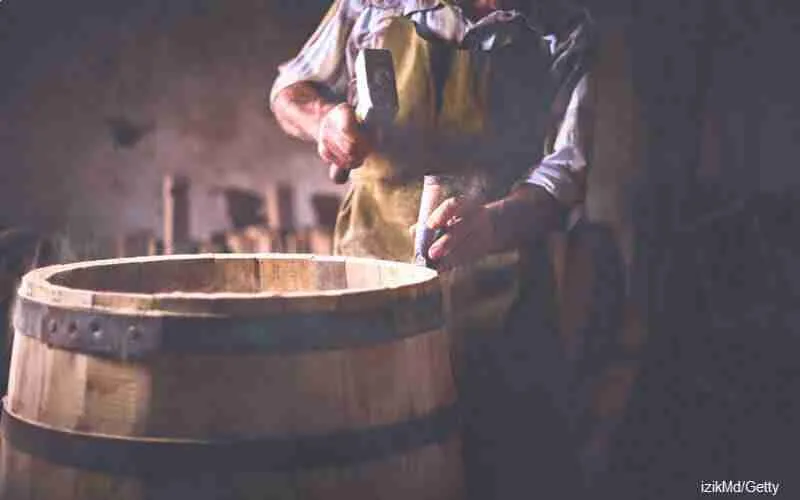
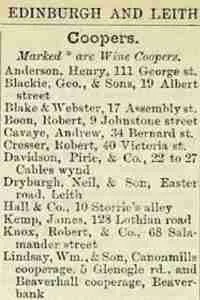

I am descended from Coopers. They lived in Harrison, Arkansas, United States. My mother said the name Cooper was always pronounced more like “Cupper” than “Cooper”.
Hello Will, yes there were and still are many different types of dialects that will pronounce this surname, as well as others, differently. Even in Scotland, someone from the west coast will pronounce something differently than someone from the east coast.
Thanks for your comment
Sarah
I am researching Caithness lads that appear on the list of Edinburgh apprentices from 1583-1666. One was a cooper- Hector Brodie son of David in Caithness. Apprenticed to John Richieson in 1633. Seems a long way to go to learn a trade which was also local. Interestingly most of the others were trainee tailors. Enjoyed reading your material
thank you Muriel. I hope you have success with your research. It is fun, isn’t it ?:)
Thanks Sarah